According to the theory for the printer he should use the most perfect side of a sheet of paper for printing! Sounds logical! Alas, in the production of stamps this turned out to be not so often the case!
Why????
In the period when stamps got printed sheet by sheet and the printed sheet got gummed afterwards, the printer just had to pay attention to the fact that the paper was fed into the press with the felt side - the far more perfect side of a sheet of paper - faced upwards! We might expect the printer to have the experience and skill to know and tell the felt side from the wire side!
But did he act accordingly??? it will be shown that he quite often did not!!
In the later period when paper for stamp printing was delivered with the gum applied to it, he had no choice! And certainly not when stamp paper got supplied to the printer in long reels that were pre-gummed....
The question could then be posed to the paper manufacturer whether he should have take care of it. I.e. that the gum was to be applied to the wire side!
Assuming that everybody involved had a good knowledge of how to use paper for printing postage stamps, we can pose that the felt side was for printing and the wire had to be gummed..... Let us call it "mormal paper" or "papel normal". In the case that the wire side got the printing and the felt side the gum, we speak of "transposed paper" or "papel traspuesto"!
N.B. there is no mention here so far of any watermark! Watermarks play no role! Watermarks have to be described in terms of how they relate to the dandy-roll - the pattern of the watermark being fixed to the cylinder called like that - and hence how they relate to the felt side of the paper - as it is the felt side that got in touch with the dandy-roll!
to be continued ...
Papel traspuesto - transposed or mislaid paper
Moderador: Rein
- Rein
- Usuario Colaborador

- Mensajes: 6258
- Registrado: 13 Mar 2009 15:59
- Ubicación: Leiden, Netherlands
- Contactar:
Re: Papel traspuesto - transposed or mislaid paper
We can do it systematically but we can alos take an at random example of a postage stamp!
The Netherlands 1953 a 10c stamp issued to raise a fund for the victims of the greatest flood in Dutch history:


There is a watermark -hardly visible of a horizontal row of circles with an alternate row a bit higher!



The grooves are plain visible at the front of the stamp! They have a bad influence on the printing quality!
The stamp was printed on a reel-fed Albert Frankenthal photogravure press, the stamp paper was delivered to the printer in long reels AND gummed!
N.B. the black "overprint" is in photogravure so just the 2nd colour in printing!
Who was responsible for this Transposed Paper???
to be continued ...
The Netherlands 1953 a 10c stamp issued to raise a fund for the victims of the greatest flood in Dutch history:


There is a watermark -hardly visible of a horizontal row of circles with an alternate row a bit higher!



The grooves are plain visible at the front of the stamp! They have a bad influence on the printing quality!
The stamp was printed on a reel-fed Albert Frankenthal photogravure press, the stamp paper was delivered to the printer in long reels AND gummed!
N.B. the black "overprint" is in photogravure so just the 2nd colour in printing!
Who was responsible for this Transposed Paper???
to be continued ...
- Rein
- Usuario Colaborador

- Mensajes: 6258
- Registrado: 13 Mar 2009 15:59
- Ubicación: Leiden, Netherlands
- Contactar:
Re: Papel traspuesto - transposed or mislaid paper
The 1949 definitives with the portrait of Queen Juliana were printed in Haarlem by the Joh. Enschedé Security Printers.


There is a watermark -hardly visible of a horizontal row of circles with an alternate row a bit higher! In Argentine terms we could have called it a "rayado" ...




The grooves are plain visible at the front of the stamp! They have a bad influence on the printing quality!
The stamp was printed on a sheet-fed Palatia (Albert Frankenthal) photogravure press. The stamp paper was delivered to the printer in long reels AND gummed, but trimmed in printers sheets before printing!
This postage stamps were in use in the 1949-1954 period!
to be continued ....


There is a watermark -hardly visible of a horizontal row of circles with an alternate row a bit higher! In Argentine terms we could have called it a "rayado" ...




The grooves are plain visible at the front of the stamp! They have a bad influence on the printing quality!
The stamp was printed on a sheet-fed Palatia (Albert Frankenthal) photogravure press. The stamp paper was delivered to the printer in long reels AND gummed, but trimmed in printers sheets before printing!
This postage stamps were in use in the 1949-1954 period!
to be continued ....
- Rein
- Usuario Colaborador

- Mensajes: 6258
- Registrado: 13 Mar 2009 15:59
- Ubicación: Leiden, Netherlands
- Contactar:
Re: Papel traspuesto - transposed or mislaid paper
The 1949 definitives with the portrait of Queen Juliana were printed in Haarlem by the Joh. Enschedé Security Printers.


There is a watermark -hardly visible of a horizontal row of circles with an alternate row a bit higher!



The grooves are plain visible at the front of the stamp! They have a bad influence on the printing quality!
The stamp was printed on a sheet-fed Palatia (Albert Frankenthal) photogravure press. The stamp paper was delivered to the printer in long reels AND gummed, but trimmed in printers sheets before printing!
This postage stamps were in use in the 1949-1954 period!
to be continued ....


There is a watermark -hardly visible of a horizontal row of circles with an alternate row a bit higher!



The grooves are plain visible at the front of the stamp! They have a bad influence on the printing quality!
The stamp was printed on a sheet-fed Palatia (Albert Frankenthal) photogravure press. The stamp paper was delivered to the printer in long reels AND gummed, but trimmed in printers sheets before printing!
This postage stamps were in use in the 1949-1954 period!
to be continued ....
- Rein
- Usuario Colaborador

- Mensajes: 6258
- Registrado: 13 Mar 2009 15:59
- Ubicación: Leiden, Netherlands
- Contactar:
Re: Papel traspuesto - transposed or mislaid paper
he 1949 definitives with the portrait of Queen Juliana were printed in Haarlem by the Joh. Enschedé Security Printers.


There is a watermark -hardly visible of a horizontal row of circles with an alternate row a bit higher! A clear case of "rayado"!



The grooves are plain visible at the front of the stamp! They have a bad influence on the printing quality!
The stamp was printed on a sheet-fed Palatia (Albert Frankenthal) photogravure press. The stamp paper was delivered to the printer in long reels AND gummed, but trimmed in printers sheets before printing!
This postage stamps were in use in the 1949-1954 period!
to be continued ....


There is a watermark -hardly visible of a horizontal row of circles with an alternate row a bit higher! A clear case of "rayado"!



The grooves are plain visible at the front of the stamp! They have a bad influence on the printing quality!
The stamp was printed on a sheet-fed Palatia (Albert Frankenthal) photogravure press. The stamp paper was delivered to the printer in long reels AND gummed, but trimmed in printers sheets before printing!
This postage stamps were in use in the 1949-1954 period!
to be continued ....
- Rein
- Usuario Colaborador

- Mensajes: 6258
- Registrado: 13 Mar 2009 15:59
- Ubicación: Leiden, Netherlands
- Contactar:
Re: Papel traspuesto - transposed or mislaid paper
The Dutch examples originate from a period in which it was normal to have uncoated paper predominantly!
With coated papers it was possible to to disguise the rough wire side of the paper. The extra layer would help in improving the printing quality.... Using coated papers was once a mean of preventing falsifications, of preventing a second use after washing off the cancellations, etc... And besides, the quality improvement of papers was much too expensive!
Only in the late 1950-ies when postal administrations had realized again that postage stamps were a good way of propagating a country in tourism and cultural or political achievements, the use of coated paper became standard!
The printers did not bother much anymore in seeing to it that the felt side was used for printing. Or rather the paper suppliers didn't care much as they were certain that the applied coatings were good enough to have either side of the stamp printed!
And that is what we see happening!
to be continued ....
With coated papers it was possible to to disguise the rough wire side of the paper. The extra layer would help in improving the printing quality.... Using coated papers was once a mean of preventing falsifications, of preventing a second use after washing off the cancellations, etc... And besides, the quality improvement of papers was much too expensive!
Only in the late 1950-ies when postal administrations had realized again that postage stamps were a good way of propagating a country in tourism and cultural or political achievements, the use of coated paper became standard!
The printers did not bother much anymore in seeing to it that the felt side was used for printing. Or rather the paper suppliers didn't care much as they were certain that the applied coatings were good enough to have either side of the stamp printed!
And that is what we see happening!
to be continued ....
- Rein
- Usuario Colaborador

- Mensajes: 6258
- Registrado: 13 Mar 2009 15:59
- Ubicación: Leiden, Netherlands
- Contactar:
Re: Papel traspuesto - transposed or mislaid paper
Back in time, to the 1920-ies:
The Argentina 1921 Postal Congress stamps!
5c:
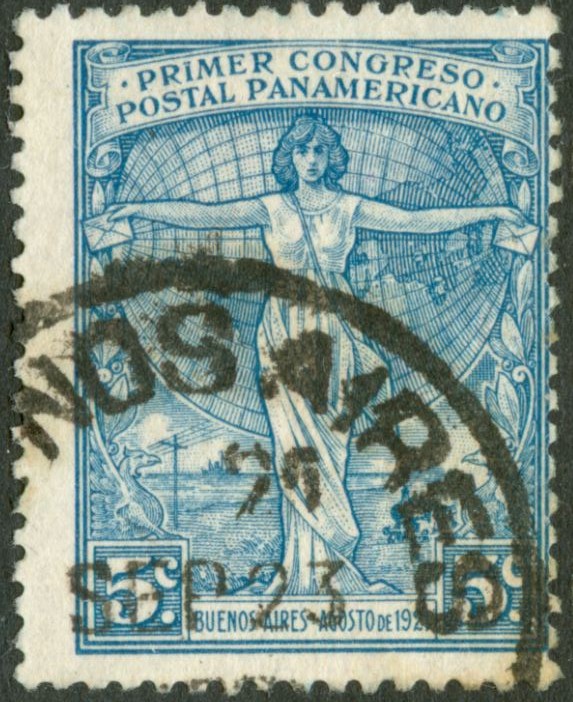
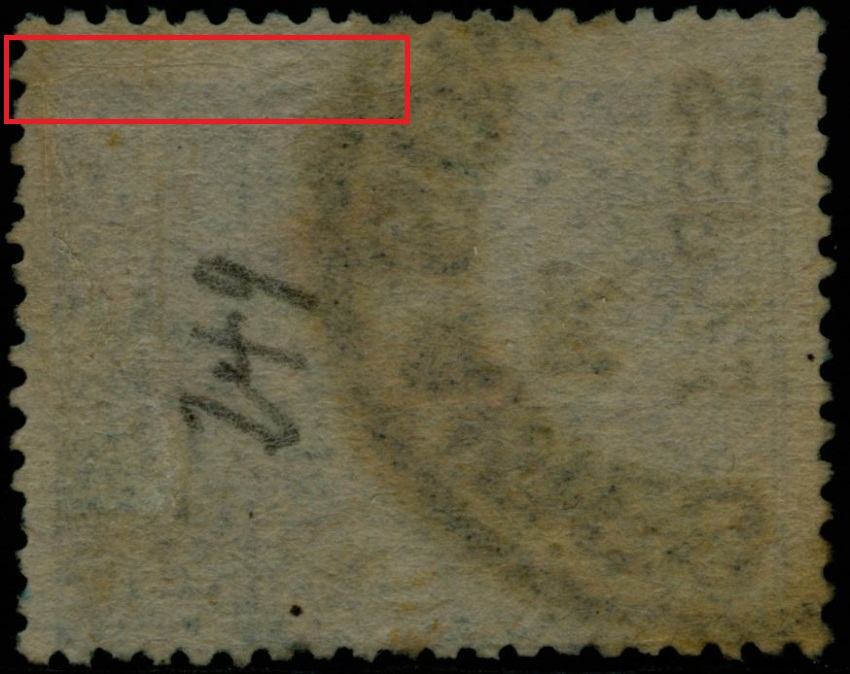
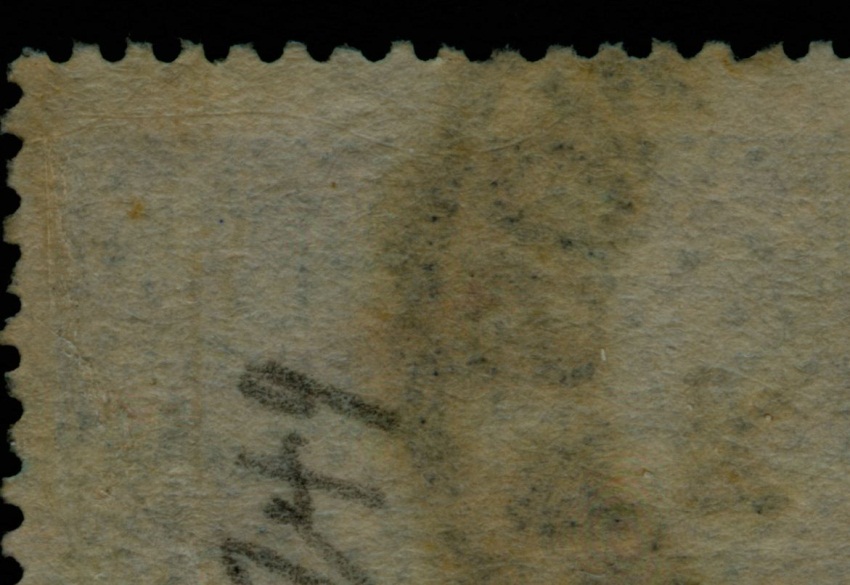
In the other corner a lot more grooves can be spotted although not that long!
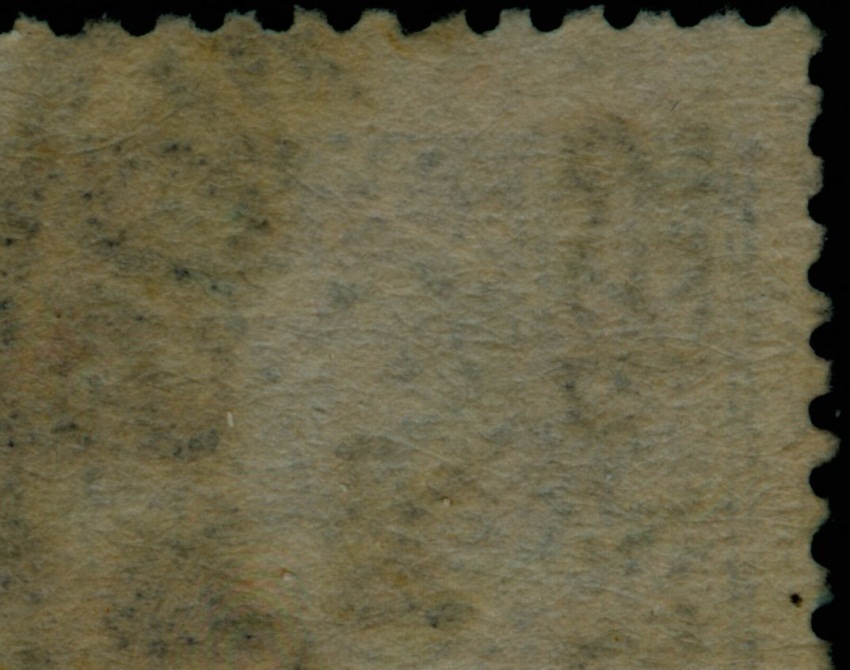
This is the Normal paper - Papel Normal - with the wire side and its grooves (surcos) gummed!!!!
to be continued ...
The Argentina 1921 Postal Congress stamps!
5c:



In the other corner a lot more grooves can be spotted although not that long!

This is the Normal paper - Papel Normal - with the wire side and its grooves (surcos) gummed!!!!
to be continued ...
- Rein
- Usuario Colaborador

- Mensajes: 6258
- Registrado: 13 Mar 2009 15:59
- Ubicación: Leiden, Netherlands
- Contactar:
Re: Papel traspuesto - transposed or mislaid paper
But the printer - or rather the Dutch paper supplier ALPAMIJ had not bothered too much taking care about which side to be gummed!
The extra long grooves can be found both at the back - as in the posting above - and at the front of the stamps!
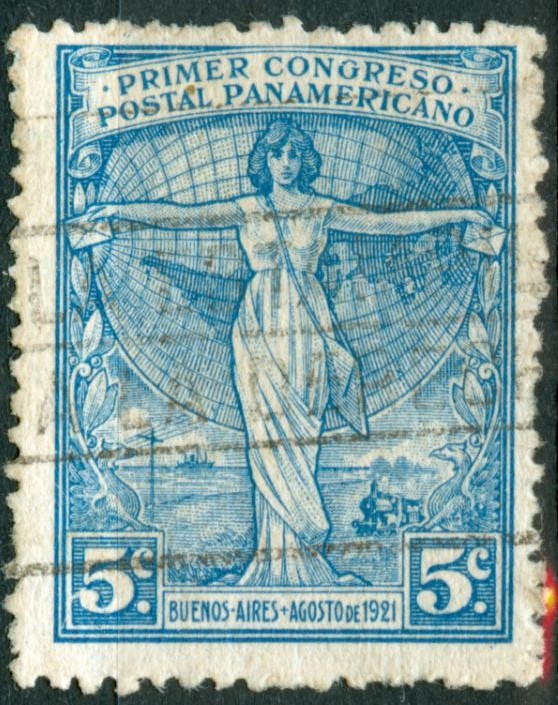
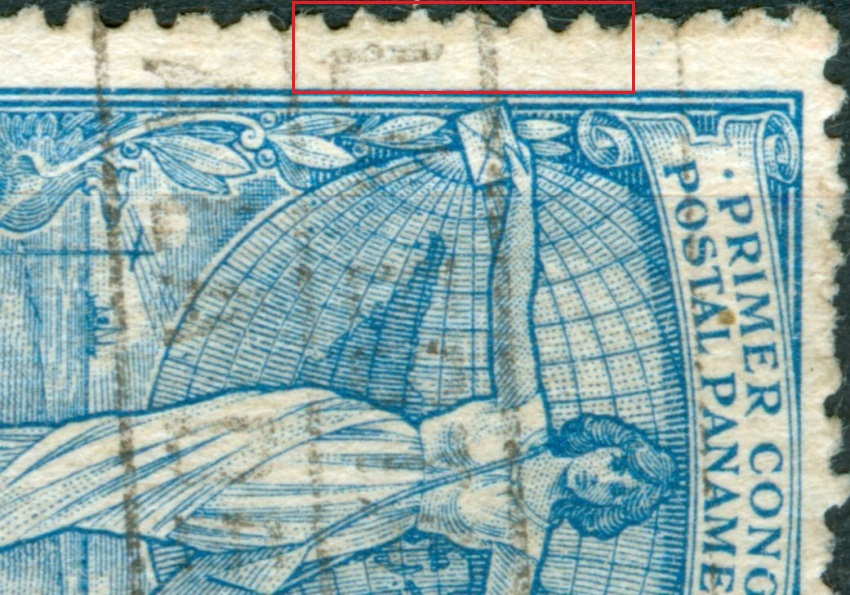
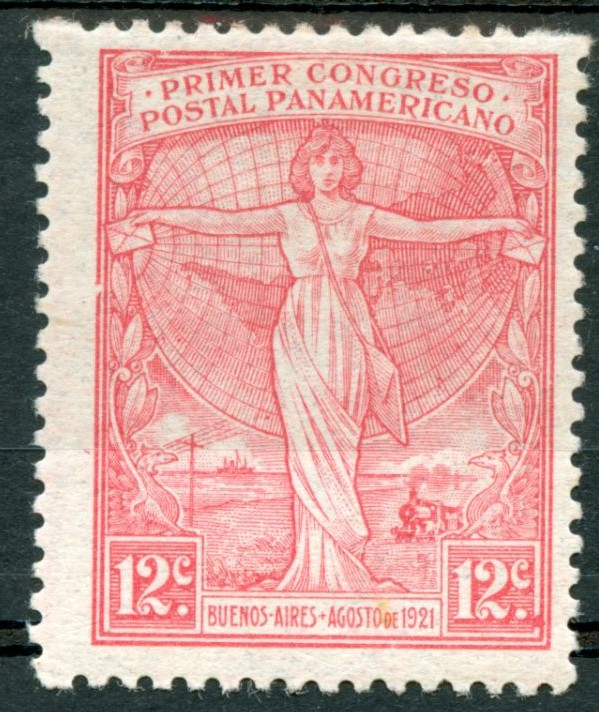
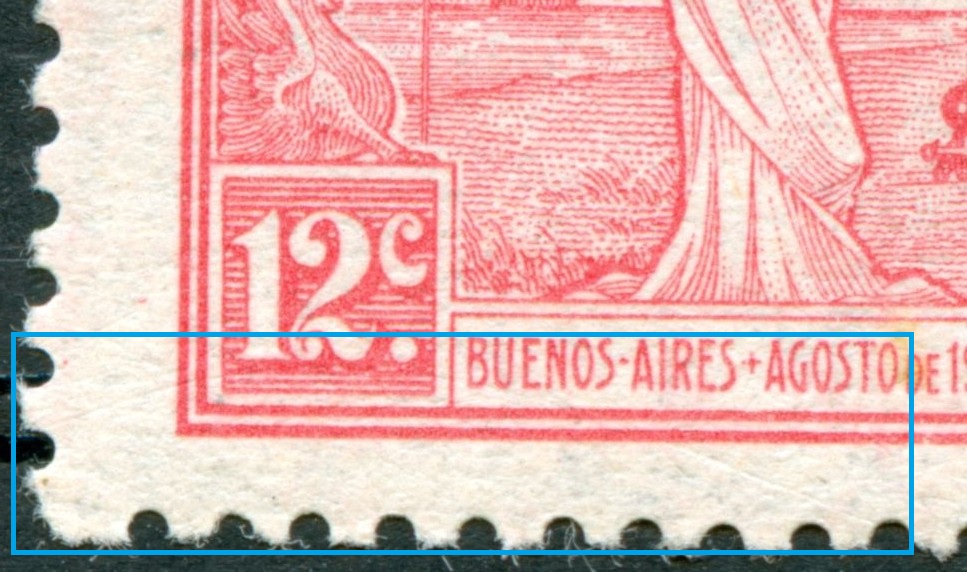
Again a superlong fiber or hair even!
We have good examples of transposed paper or papel traspuesto here!
to be continued ...
The extra long grooves can be found both at the back - as in the posting above - and at the front of the stamps!




Again a superlong fiber or hair even!
We have good examples of transposed paper or papel traspuesto here!
to be continued ...